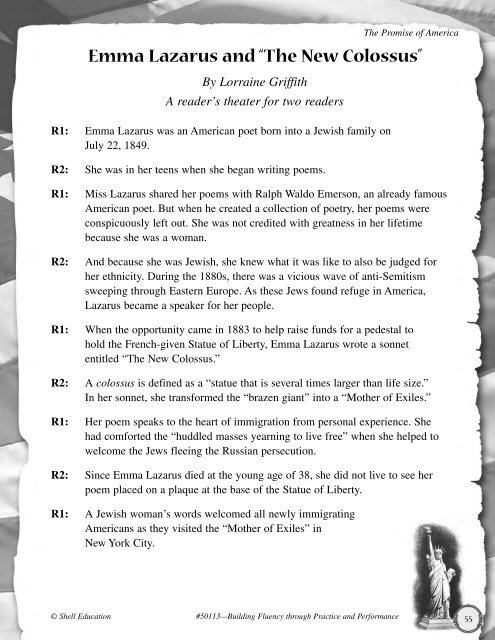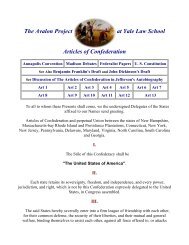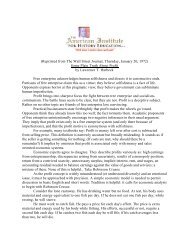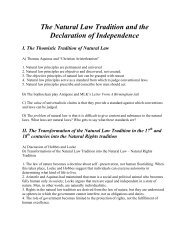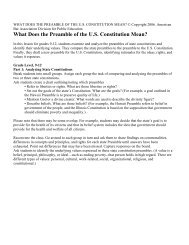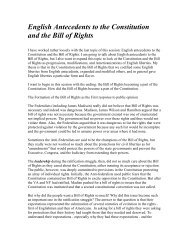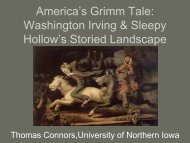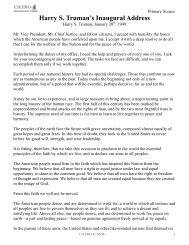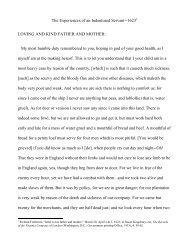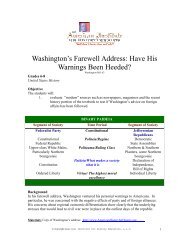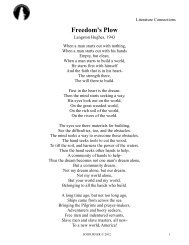Emma Lazarus and - American Institute for History Education
Emma Lazarus and - American Institute for History Education
Emma Lazarus and - American Institute for History Education
Create successful ePaper yourself
Turn your PDF publications into a flip-book with our unique Google optimized e-Paper software.
© Shell <strong>Education</strong> #50113—Building Fluency through Practice <strong>and</strong> Per<strong>for</strong>mance<br />
The Promise of America<br />
<strong>Emma</strong> <strong>Lazarus</strong> <strong>and</strong> “The New Colossus”<br />
By Lorraine Griffith<br />
A reader’s theater <strong>for</strong> two readers<br />
R1: <strong>Emma</strong> <strong>Lazarus</strong> was an <strong>American</strong> poet born into a Jewish family on<br />
July 22, 1849.<br />
R2: She was in her teens when she began writing poems.<br />
R1: Miss <strong>Lazarus</strong> shared her poems with Ralph Waldo Emerson, an already famous<br />
<strong>American</strong> poet. But when he created a collection of poetry, her poems were<br />
conspicuously left out. She was not credited with greatness in her lifetime<br />
because she was a woman.<br />
R2: And because she was Jewish, she knew what it was like to also be judged <strong>for</strong><br />
her ethnicity. During the 1880s, there was a vicious wave of anti-Semitism<br />
sweeping through Eastern Europe. As these Jews found refuge in America,<br />
<strong>Lazarus</strong> became a speaker <strong>for</strong> her people.<br />
R1: When the opportunity came in 1883 to help raise funds <strong>for</strong> a pedestal to<br />
hold the French-given Statue of Liberty, <strong>Emma</strong> <strong>Lazarus</strong> wrote a sonnet<br />
entitled “The New Colossus.”<br />
R2: A colossus is defined as a “statue that is several times larger than life size.”<br />
In her sonnet, she trans<strong>for</strong>med the “brazen giant” into a “Mother of Exiles.”<br />
R1: Her poem speaks to the heart of immigration from personal experience. She<br />
had com<strong>for</strong>ted the “huddled masses yearning to live free” when she helped to<br />
welcome the Jews fleeing the Russian persecution.<br />
R2: Since <strong>Emma</strong> <strong>Lazarus</strong> died at the young age of 38, she did not live to see her<br />
poem placed on a plaque at the base of the Statue of Liberty.<br />
R1: A Jewish woman’s words welcomed all newly immigrating<br />
<strong>American</strong>s as they visited the “Mother of Exiles” in<br />
New York City.
The Promise of America<br />
All: The Statue of Liberty<br />
The Statue of Liberty<br />
By Lorraine Griffith<br />
A reader’s theater <strong>for</strong> three readers<br />
R1: A gift from the people of France<br />
R2: Over 100 years ago<br />
R3: To the people of the United States<br />
R1: As a symbol of friendship established during the<br />
<strong>American</strong> Revolution over 200 years ago.<br />
R2: Now a symbol of freedom<br />
R3: Democracy<br />
R2: International friendship<br />
All: Welcome<br />
R1: To the United States of America<br />
R2: Over 300 feet from ground to tip of torch<br />
R3: An index finger eight feet long<br />
R1: One eye, two-<strong>and</strong>-one-half feet across<br />
R2: Thirty-one tons of copper<br />
R3: One hundred twenty-five tons of steel<br />
R1: Twenty-seven thous<strong>and</strong> tons of concrete<br />
#50113—Building Fluency through Practice <strong>and</strong> Per<strong>for</strong>mance © Shell <strong>Education</strong>
R2: Three hundred fifty-four steps from ground to crown<br />
R3: Twenty-two stories high<br />
R1: Twenty-five windows in the crown<br />
R2: Symbolizing natural minerals found on Earth<br />
R3: And heaven’s rays shining over the world<br />
R1: A toga<br />
R2: The Ancient Republic of Rome<br />
R3: Torch<br />
R1: Enlightenment<br />
R2: Chains underfoot<br />
All: Liberty crushing the chains of slavery<br />
R3: Seven rays of the Statue’s crown<br />
R2: The seven seas<br />
R1: The seven continents<br />
R1: And on the tablet<br />
R2: In Roman numerals<br />
All: July 4, 1776<br />
The Statue of Liberty (cont .)<br />
R3: America’s Independence Day<br />
© Shell <strong>Education</strong> #50113—Building Fluency through Practice <strong>and</strong> Per<strong>for</strong>mance<br />
The Promise of America
The Promise of America<br />
The Statue of Liberty (cont .)<br />
R1: President Grover Clevel<strong>and</strong><br />
R2: October 28, 1886<br />
R3: Accepting the statue from France<br />
All: “We will not <strong>for</strong>get that Liberty has here made her home;<br />
nor shall her chosen altar be neglected.”<br />
Background<br />
In<strong>for</strong>mation<br />
The United States needed<br />
France’s help to win the<br />
Revolutionary War against<br />
the British. With the help<br />
of Benjamin Franklin, both<br />
nations developed a friendship.<br />
In 1886, France gave the Statue<br />
of Liberty to the United States<br />
as a gift of that friendship. The<br />
huge statue was broken down<br />
into 350 pieces <strong>and</strong> shipped in<br />
214 crates. Due to bad storms,<br />
the ship nearly sank at sea.<br />
Once at its destination, it took<br />
four months to reassemble.<br />
#50113—Building Fluency through Practice <strong>and</strong> Per<strong>for</strong>mance © Shell <strong>Education</strong>
The Promise of America<br />
<strong>Emma</strong> <strong>Lazarus</strong> <strong>and</strong> “The New Colossus” (cont .)<br />
Both: “The New Colossus,” by <strong>Emma</strong> <strong>Lazarus</strong><br />
R1: Not like the brazen giant of Greek fame,<br />
with conquering limbs astride from l<strong>and</strong> to l<strong>and</strong>;<br />
R2: Here at our sea-washed, sunset gates<br />
shall st<strong>and</strong> a mighty woman with a torch,<br />
whose flame is the imprisoned lightning,<br />
R2: <strong>and</strong> her name<br />
R1: Mother of Exiles .<br />
R2: From her beacon-h<strong>and</strong> glows world-wide welcome;<br />
R1: her mild eyes comm<strong>and</strong> the air-bridged harbor that twin cities frame .<br />
Both: “Keep ancient l<strong>and</strong>s, your storied pomp!”<br />
R2: cries she with silent lips .<br />
Both: “Give me your tired, your poor, your huddled masses yearning to breathe free,<br />
the wretched refuse of your teeming shore. Send these, the homeless, tempesttost<br />
to me, I lift my lamp beside the golden door!”<br />
Background<br />
In<strong>for</strong>mation<br />
The first two lines of “The New<br />
Colossus” talk about a Greek<br />
statue called the Colossus<br />
of Rhodes. This statue is no<br />
longer st<strong>and</strong>ing today, but<br />
people who saw it long ago<br />
described it. The statue was the<br />
Greek god Helios <strong>and</strong> it was<br />
erected on the Greek isl<strong>and</strong> of<br />
Rhodes. It was about the same<br />
size as the Statue of Liberty.<br />
#50113—Building Fluency through Practice <strong>and</strong> Per<strong>for</strong>mance © Shell <strong>Education</strong>
“The Immigrant”<br />
Per<strong>for</strong>med by Neil Sedaka<br />
Harbors open there doors to the young searching <strong>for</strong>eigner<br />
Come to live in the light of the big L of liberty<br />
Plains <strong>and</strong> open skies bill boards would advertise<br />
Was it anything like that when you arrived<br />
Dream boats carried the future to the heart of America<br />
People were waiting in line <strong>for</strong> a place by the river<br />
Chorus<br />
It was time when strangers were welcome here<br />
Music would play they tell me the days were sweet <strong>and</strong> clear<br />
It was a sweeter tune <strong>and</strong> there was so much room<br />
That people could come from everywhere<br />
Now he arrives with hopes <strong>and</strong> his heart set on miracles<br />
Come to marry his <strong>for</strong>tune with a h<strong>and</strong> full of promises<br />
To find they've closed the door they don't want him anymore<br />
There isn't anymore to go around<br />
Turning away he remembers he once heard a legend<br />
That spoke of a mystical magical l<strong>and</strong> called America<br />
It was time when strangers were welcome here<br />
Music would play they tell me the days were sweet <strong>and</strong> clear<br />
It was a sweeter tune <strong>and</strong> there was so much room<br />
That people could come from everywhere<br />
It was time when strangers were welcome here<br />
Music would play they tell me the days were sweet <strong>and</strong> clear<br />
It was a sweeter tune <strong>and</strong> there was so much room<br />
That people could come from everywhere
• AMERICA<br />
Written <strong>and</strong> Per<strong>for</strong>med by Neil Diamond<br />
Far<br />
We've been traveling far<br />
Without a home<br />
But not without a star<br />
Free<br />
Only want to be free<br />
We huddle close<br />
Hang on to a dream<br />
On the boats <strong>and</strong> on the planes<br />
They're coming to America<br />
Never looking back again<br />
They're coming to America<br />
Home, don't it seem so far away<br />
Oh, we're traveling light today<br />
In the eye of the storm<br />
In the eye of the storm<br />
Home, to a new <strong>and</strong> a shiny place<br />
Make our bed, <strong>and</strong> we'll say our grace<br />
Freedom's light burning warm<br />
Freedom's light burning warm<br />
Everywhere around the world<br />
They're coming to America<br />
Every time that flag's unfurled<br />
They're coming to America<br />
Got a dream to take them there<br />
They're coming to America<br />
Got a dream they've come to share<br />
They're coming to America<br />
They're coming to America<br />
They're coming to America<br />
They're coming to America<br />
They're coming to America<br />
Today, today, today, today, today<br />
My country 'tis of thee<br />
Today<br />
Sweet l<strong>and</strong> of liberty<br />
Today<br />
Of thee I sing<br />
Today<br />
Of thee I sing<br />
Today
Vachel Lindsay. 1879–1931<br />
82. The Eagle That Is Forgotten<br />
[John P. Altgeld. Born December 30, 1847; died March 12, 1902.]<br />
SLEEP softly * * * eagle <strong>for</strong>gotten * * * under the stone.<br />
Time has its way with you there, <strong>and</strong> the clay has its own.<br />
"We have buried him now," thought your foes, <strong>and</strong> in secret rejoiced.<br />
They made a brave show of their mourning, their hatred unvoiced.<br />
They had snarled at you, barked at you, foamed at you, day after day, 5<br />
Now you were ended. They praised you, * * * <strong>and</strong> laid you away.<br />
The others that mourned you in silence <strong>and</strong> terror <strong>and</strong> truth,<br />
The widow bereft of her pittance, the boy without youth,<br />
The mocked <strong>and</strong> the scorned <strong>and</strong> the wounded, the lame <strong>and</strong> the poor<br />
That should have remembered <strong>for</strong>ever, * * * remember no more. 10<br />
Where are those lovers of yours, on what name do they call<br />
The lost, that in armies wept over your funeral pall?<br />
They call on the names of a hundred high-valiant ones,<br />
A hundred white eagles have risen, the sons of your sons,<br />
The zeal in their wings is a zeal that your dreaming began 15<br />
The valor that wore out your soul in the service of man.<br />
Sleep softly, * * * eagle <strong>for</strong>gotten, * * * under the stone,<br />
Time has its way with you there <strong>and</strong> the clay has its own.<br />
Sleep on, O brave hearted, O wise man, that kindled the flame—<br />
To live in mankind is far more than to live in a name, 20<br />
To live in mankind, far, far more * * * than to live in a name.
Lyrics An-: ysis \m-m-lr[-- - - - - t<br />
Step 1.Observatlon<br />
A. Listen to the song. Form an overall impression of the song. Jot down or describe your overall feeling (e.g., sadness or joy). Next,<br />
examine individual lyrics. B. Use the chart below to list musicians, style, <strong>and</strong> lyrics in the song.<br />
Musicians<br />
Step 2. Inference<br />
Based an your analysis above, list three things you might infer from the song.<br />
1.<br />
2.<br />
3.<br />
Step 3. Questions<br />
A. What questions do these lyrics raise in your mind? E. List two things the song tells you about life in the United States<br />
at the time it was written:<br />
B. Where could you find the answers?<br />
C. Why do you think this song was written?<br />
D. What evidence in the song helps you know why itwaswritten?<br />
Quote from the lyrics.<br />
Style Lyrics<br />
F. Write a question to the composer that is left unanswered by<br />
this song.<br />
G. How might this song be useful to historians?<br />
Teacherk note: An excellent source <strong>for</strong> songs of this time period is Smithsonian Folkway Recordings, 750 9th Street NW, Suite 4100,<br />
Washington, DC 20560-0953, www.Folkways.sl.edu or www.Folklife.sl.edu.


